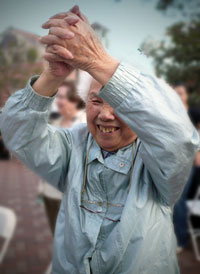Frances Wu DSW '74
June 01, 2010- Alumni

For 15 years during the 1960s and 70s, Frances Wu helped delinquent children work through personal problems. But she later discovered another group in need.
While working as a psychiatric social worker in New York, Wu became aware of the plight of Chinese immigrants, particularly the elderly. Since many did not speak English, they did not feel comfortable going out because they could not read or recognize signs. Left alone all day while their adult children worked and grandchildren went to school, they felt lonely and isolated.
Since learning of their struggle, Wu switched her focus from the young to the old and has since dedicated herself as a tireless advocate for older Chinese immigrants. Her significant contributions in the field of social work, and her generosity and devotion as a distinguished alumna recently earned Wu an honorary Doctor of Humane Letters from the University of Southern California.
Wu credits all her success to the booming real estate market in the 1980s which allowed her to accumulate enough wealth to make over 60 gifts to the university since 1975, including $1.5 million in 1997 to the USC School of Social Work to establish an endowed chair.
"I couldn't have done anything without the real estate," she said. "I am very grateful."
Born in China herself, Wu empathized with the struggles of Chinese immigrants and recognized the need to improve services for them. Determined to help, she left New York where she was also a field instructor at Columbia University School of Social Work and moved to California to study aging and administration in 1971.
The transition from full-time social worker to full-time student was not an easy one for Wu. Although she received a scholarship and stipend, there were many emotional and financial adjustments. But she persevered and in 1974, she became the first Chinese American to receive a doctoral degree from USC's School of Social Work.
While working on her dissertation, Wu had met more than 50 elderly Chinese Americans. Through these connections, she founded the Chinese American Golden Age Association (CAGAA) after she graduated. The main goal of CAGAA was to build an apartment building for senior citizens. Wu knew it would be a difficult task but she was determined to see the dream realized. So when her application for a loan to finance the construction was rejected in 1977, she was not discouraged. Instead, she turned to the U.S. Department of Housing and Urban Development.
With the association's help, Wu raised most of the funds needed to qualify for the HUD loan but because the association had no track record, she still needed a co-sponsor. USC's Andrus Gerontology Center agreed. After four years of working on the project as an unpaid volunteer and living on personal savings, Wu received final approval for the project loan in 1978.
Two years later, the 120-unit Golden Age Village apartment complex for the low-income elderly population opened with 400 names on the waiting list. Residents enjoyed the complex because they could socialize with others with similar experiences. Most shared the same language and culture. Because it was so popular, few relocated. There was a waiting list until 1989.
"The elderly Chinese have the friendly companionship and help each other," Wu said in a 1997 interview with The Citizen, a monthly publication that catered to senior citizens. "They are happier here than living with their sons and daughters. There is a great generation gap because their children are Americanized and the senior citizens are Chinese-old fashioned."
The real estate market in the 1980s allowed for the development of two new private projects on the same land. Golden Age Manor, a 33-unit condominium complex, was unveiled in 1986; and in 1994, the 29-unit Golden Age Villas opened. The entire complex was distinctly Chinese with bright-colored balconies overlooking serene courtyards. Each complex featured a small pond with fountains or waterfalls and a bright red arched bridge. Wu designed it herself.
The complex received five superior ratings from HUD and a beautification award from the city of Monterey Park.
Wu's accomplishments extend beyond CAGAA. She has helped local Chinese communities develop professional services by providing advice to board and staff members from numerous philanthropic organizations in Los Angeles, especially in Monterey Park and Chinatown. Because very few Chinese people in Los Angeles in the 1980s understood the complex welfare systems in the United States, Wu helped organizations integrate to the mainstream human service systems.
Even today, at age 89, Wu continues to put the welfare of the Chinese elderly above her own and remains president of the Chinese American Golden Age Association.
To reference the work of our faculty online, we ask that you directly quote their work where possible and attribute it to "FACULTY NAME, a professor in the USC Suzanne Dworak-Peck School of Social Work” (LINK: https://dworakpeck.usc.edu)